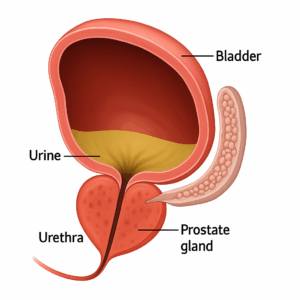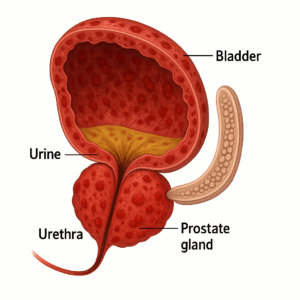Benign Prostatic Hyperplasia (BPH) or Enlarged Prostate
What is Benign Prostatic
Hyperplasia (BPH)?
An enlarged prostate is a common condition among aging men. Known as benign prostatic hyperplasia (BPH), this non-cancerous condition affects approximately half of men between the ages of 51 and 60, and up to 90% of men over 80. In the United States, around 14 million men are affected by BPH.
The prostate gland, situated near the bladder, is typically the size of a walnut. However, in cases of BPH, it can enlarge to the size of a tennis ball. This enlargement can exert pressure on the urethra, the tube responsible for carrying urine out of the body, potentially restricting urine flow or, in severe cases, completely obstructing it.


Common Symptoms of BPH
In some cases, it can lead to painful urination, reduced sex drive, erectile dysfunction and urinary continence or retention (the inability to urinate). Most men with BPH are unhappy with the condition and do not wish to live the rest of their lives with its symptoms, which typically include:
- Frequent Urination
- Difficulty Starting Urination
- Intermittent Urine Flow
- Urgency to Urinate
- Weak Urine Stream
- Dribbling at the End of Urination
Causes of BPH
Benign Prostatic Hyperplasia (BPH), or enlarged prostate, is primarily a result of natural hormonal changes as men age, but several biological, genetic, and lifestyle factors can contribute to its development. Understanding these causes can help in early identification and prevention strategies.
- The most significant risk factor for BPH is age. By the age of 60, nearly 50% of men show signs of prostate enlargement. That figure rises to up to 90% by the age of 85
- Men with a family history of BPH or prostate conditions are more likely to develop the condition themselves. If your father or brothers have had BPH, your risk increases significantly
Determine Your BPH Symptoms
Treatment Options
Lifestyle Changes for BPH Relief
For men with mild to moderate symptoms, natural lifestyle changes can significantly reduce urinary discomfort and improve quality of life. These techniques are often recommended as a first-line approach or to complement medical treatments.
Recommended Changes:
- Reduce Caffeine and Alcohol: These can irritate the bladder and increase urgency.
- Timed Voiding: Urinate at regular intervals to reduce urgency and incontinence.
- Limit Evening Fluids: To decrease nighttime urination (nocturia).
- Double Voiding: Wait a few moments after urinating, then try again to fully empty your bladder.
- Stay Active: Regular exercise improves pelvic circulation and hormone regulation.
- Healthy Diet: Eat more fruits, vegetables, and omega-3s while reducing red meat and saturated fats.
Medications for BPH
Medications can help shrink the prostate or relax muscles around the bladder to improve urine flow. For men seeking non-surgical treatments, these are highly effective and widely used.
Prescription Medications:
- Alpha Blockers (e.g., tamsulosin, alfuzosin): Relax the muscles of the prostate and bladder neck.
- 5-Alpha Reductase Inhibitors (e.g., finasteride, dutasteride): Reduce prostate size over time by blocking DHT hormone production.
Minimally Invasive Procedures for BPH
For men who don’t respond to medications or prefer to avoid long-term drug use, minimally invasive BPH treatments offer excellent results with faster recovery and fewer side effects than traditional surgery.
Minimally Invasive Options:
- Prostate Artery Embolization: An interventional radiology technique that shrinks the prostate by blocking blood flow.
- UroLift® System: Places tiny implants to hold the prostate open, relieving obstruction without removing tissue.
